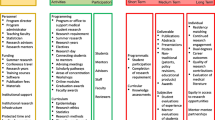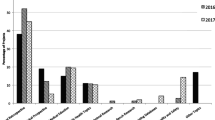Abstract
Medical school research has been shown to influence many aspects of medical students’ professional careers, including medical knowledge, medical literature evaluation, and presentation skills. Few studies have looked at the impact of research on specialty choice and vice versa. We conducted a retrospective survey study to look at the relationship of medical student research and specialty choice. We found that students entering historically competitive specialties published and presented more during medical school and during graduate medical education than students entering other specialties. We also found that students reported that their specialty choice had a greater impact on their research, than their research influencing their specialty choice. We want to conduct future studies on the factors that lead medical students towards or away from research and how medical schools can revise curricula or medical student advisement to improve participation.
Similar content being viewed by others
Avoid common mistakes on your manuscript.
Medical student research has been shown to influence students’ career choices, learning, perceptions, literature evaluation skills, writing skills, and academic productivity [1, 2]. Interestingly, despite multiple studies looking at the impact of medical student research programs on future career interests, few studies have looked at the relationship of specialty choice and medical student research [2–8]. We wanted to assess whether the medical students’ research at Mayo Medical School impacted their specialty choice or vice versa. We were also interested in learning whether specialty choice had an impact on medical student academic productivity.
We surveyed 1133 current and former Mayo Medical School students (374 responses, 33 %) about their research experiences before, during, and after medical school. We grouped students based on the AAMC reported statistics into historically competitive specialties (group 2), with USMLE Step 1 and 2 scores higher than 240 and percent AOA membership higher than 20 %, on average, and all other specialties (group 1) [9, 10]. We found that group 2 students, including students entering dermatology, radiology, neurosurgery, ophthalmology, orthopedic surgery, otolaryngology, plastic surgery, radiation oncology, and urology, published significantly more papers and gave significantly more presentations during medical school than group 1 students. Group 2 students’ academic productivity continued into postgraduate medical education, with group 2 students producing significantly more publications and presentations than group 1 students. Analyzing all the students’ data, we found that they reported a more significant impact of their specialty choice on their medical school research than the impact of their research on their specialty choice.
This study is the first study to look at and assess the relationship of specialty choice and medical research productivity. A few studies have found an association between the research topics pursued by the students and their specialty choices [3, 5, 7], but they did not determine whether the choice of medical research topic influenced the specialty choice or whether the specialty choice influenced the research topic [2]. In this study, we found that medical students reported a significantly higher impact of their specialty choice on their medical research than their research on their specialty choice.
Looking forward, we want to study what factors lead medical students toward or away from medical research. We are also interested in how medical school research curricula can be tailored to help all students enjoy the benefits of research.
References
Peacock JG, Warner LL, Drozdowicz LB, Martin BA, Suresh R, Denzer BJ, et al. Curricular flexibility in the pre-clinical years promotes medical student scholarship. Med Sci Educ [Internet]. 2014 Jan 17 [cited 2014 Mar 23];23(S1):92–8. Available from: http://springerlink.bibliotecabuap.elogim.com/10.1007/BF03341813.
Bierer SB, Chen HC. How to measure success: the impact of scholarly concentrations on students—a literature review. Acad Med [Internet]. 2010/02/26 ed. 2010;85(3):438–52. Available from: http://www.ncbi.nlm.nih.gov/pubmed/20182116.
Chongsiriwatana KM, Phelan ST, Skipper BJ, Rhyne RL, Rayburn WF. Required research by medical students and their choice of a women’s health care residency. Am J Obstet Gynecol [Internet]. 2005/05/20 ed. Elsevier; 2005 May 5 [cited 2014 Sep 4];192(5):1478–80. Available from: http://www.ncbi.nlm.nih.gov/pubmed/15902143.
Campos-Outcalt D, Senf J, Watkins AJ, Bastacky S. The effects of medical school curricula, faculty role models, and biomedical research support on choice of generalist physician careers: a review and quality assessment of the literature. Acad Med [Internet]. 1995 Jul [cited 2014 Sep 13];70(7):611–9. Available from: http://www.ncbi.nlm.nih.gov/pubmed/7612127.
Ebbert A. A retrospective evaluation of research in the medical curriculum. J Med Educ [Internet]. 1960 Jul [cited 2014 Sep 13];35:637–43. Available from: http://www.ncbi.nlm.nih.gov/pubmed/13819145.
Legardeur B, Lopez A, Johnson WD. Evaluation of short research experiences in cancer. J Cancer Educ [Internet]. 1993 Jan [cited 2014 Sep 13];8(4):265–8. Available from: http://www.ncbi.nlm.nih.gov/pubmed/8186077.
Wagner RFM, PharmD BI. Medical student dermatology research in the United States. Dermatol Online J [Internet]. 2005 Jan 1 [cited 2014 Aug 28];11(1). Available from: https://escholarship.org/uc/item/97m4p870.
Rosenberg SN. A survey of physicians who studied public health during medical school. Am J Prev Med [Internet]. 1998 Apr [cited 2014 Sep 13];14(3):184–8. Available from: http://www.ncbi.nlm.nih.gov/pubmed/9569218.
Colleges NRMP and A of AM. Charting outcomes in the match: characteristics of applicants who matched to their preferred specialty in the 2011 main residency match [Internet]. 2011 [cited 2014 Sep 15]. p. 1–264. Available from: http://www.nrmp.org/wp-content/uploads/2013/08/chartingoutcomes2011.pdf.
Colleges A of AM. Careers in medicine [Internet]. 2014 [cited 2014 Sep 15]. Available from: https://www.aamc.org/cim/profile.
Authors’ Contributions
J.G.P. conducted the medical student survey, analyzed the composite data, prepared the figures, and wrote the manuscript. J.P.G. provided intellectual guidance and reviewed the manuscript.
Disclaimer
The view(s) expressed herein are those of the author(s) and do not reflect the official policy or position of Brooke Army Medical Center, the U.S. Army Medical Department, the U.S. Army Office of the Surgeon General, the Department of the Army, the Department of the Air Force and Department of Defense, or the U.S. Government.
Conflict of Interest
No conflicts of interest to disclose.
Author information
Authors and Affiliations
Corresponding author
Rights and permissions
About this article
Cite this article
Peacock, J.G., Grande, J.P. The Impact of Specialty Choice on Medical Student Research. Med.Sci.Educ. 24 (Suppl 1), 19–20 (2014). https://doi.org/10.1007/s40670-014-0088-0
Published:
Issue Date:
DOI: https://doi.org/10.1007/s40670-014-0088-0




